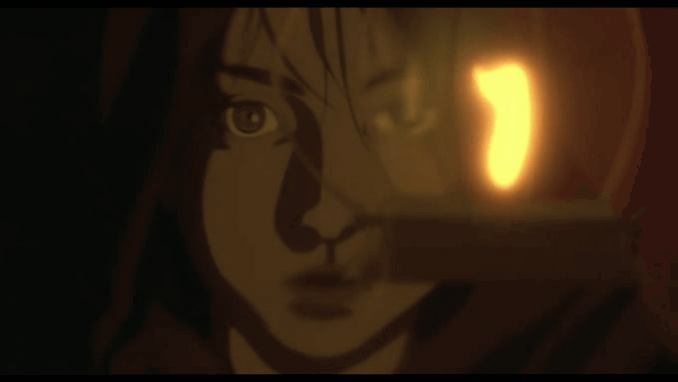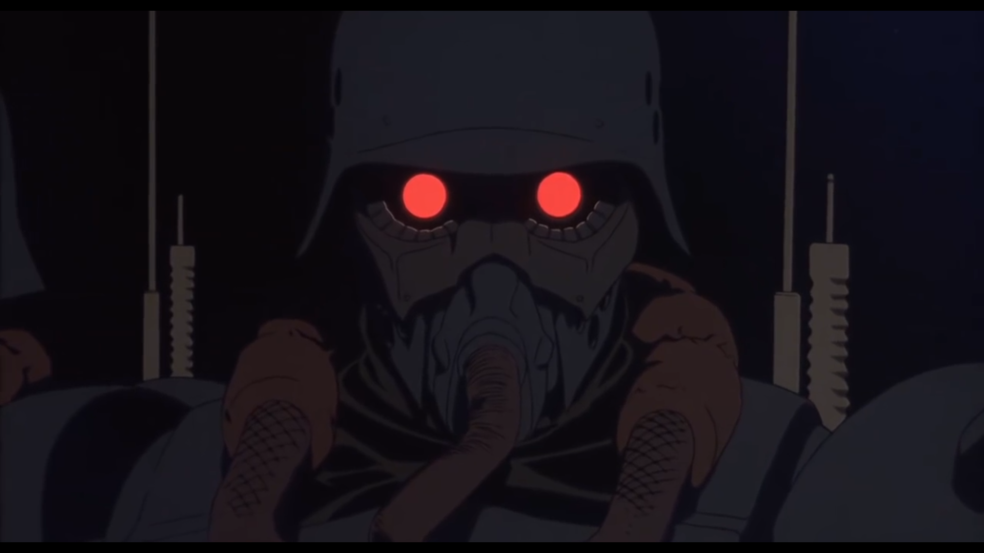“Why?”
A soldier asks a young girl holding a bag of bombs.
“Why?” This question is symbolic – the first line uttered by our silent protagonist, and a sign of his humanity hidden under layers of terrifying armoury.
Then the girl blows herself up.
So begins Jin-Roh, the Wolf Brigade, an hour 40 minutes of calculated storytelling, building up to the best resolution in any movie ever. It’s emotional, gorgeously animated and brutally dedicated, the perfect conclusion and affirmation of the movie’s themes.
I was not impressed with Jin Roh the first time I watched it. Certain parts of it, parts to do with the protagonist, were compelling, but much of the show was bogged down by dull cryptic conversations between characters I didn’t care about. But I couldn’t stop thinking the ending. That ending… There was something on the tip of its tongue, some missing piece of the puzzle. I felt I was being unfair, and so gave the film a second viewing. And all revealed itself. The fog cleared and I could see the film for what it was. Jin Roh’s understated tendencies definitely work against it initially, but upon re-watch you come away with a deeper appreciation of its themes.
The soldier Fuse, is haunted by memories of the girl. He sees her during training exercises, in his dreams, and in her sister, her doppelganger. The two meet at her grave and strike up a melancholic relationship. Their steps are shadowed by a more twisted version of Little Red Riding Hood, where you’re never quite sure who is the wolf and who is the girl. This game of cat and mouse is reflected, on a cruder level, in the political conflict that forms the background for this romance. On my first viewing, this was the weakest part, but it’s so tightly wound with the best element of the film – Fuse’s characterisation- that I felt to dismiss it as bad would do a serious discredit. Undeniably, I was not enthralled, but it did form the perfect foundation for Fuse’s character arc to flourish. Fuse is a deeply understated character- he speaks very little and emotes very little. He’s a man constantly fighting his own humanity. He expresses, or the film expresses his feelings through careful visual framing and little gestures: the way he carries himself with a sort of downtrodden-ness, his perpetual stare, the pointed-ness of his few sentences, and most importantly, his silence. His silence speaks.
Much of this anime is subtle character and machinery animation. I had high hopes for it considering its director was Hiroyuki Okiura, a master at realist animation. When the animation kicks in, much of it is beautiful and organic, reflecting the attention to detail that would come from having the likes of Tetsuya Nishio and Toshiyuki Inoue (great animators of movement) supervise the film’s animation- all whilst appealing to Okiura’s own realist sensibilities. Okiura himself animates some of the film’s best cuts and his understanding of human expression is evident in those. The characters move carefully- no look, no gesture is wasted as the animation visually conveys their observant, paranoid nature. The general design/aesthetic is very fitting. The character designs are the closest to realism I’ve ever seen (without succumbing to the uncanny valley); this realism allowed for diversity between characters. I loved the design of the Special Unit. They’re these heavily armoured men wearing face guards with glowing red eyes. These designs always stood out on screen and they were framed in menacing, eerie ways.
The music is gorgeous. This is one of the few soundtracks I would actually buy, because of just how much I love. It really elevated every scene it was in. It worked nicely against the film’s silence, filling out the scenes of wanderlust, then dimming down in dialogue scenes. There was a constant push and pull between the silence and the music, and I loved it. The English dub was a pleasant surprise. It carried itself with a sort of dignity and elegance; the voice actors really embraced the melancholy of the film and reflected it in their performances. It is uneven, but I never had any difficulty believing in the characters they were playing. Moneca Stori’s performance as Kei, the dead girl’s sister, was especially good. It was the performance I was most dreading, but Stori played her as dreamy, whimsical and a little naive, whilst keeping her character grounded to the film’s reality. She had the most emotionally heavy scenes to play, and again, they were generally uneven. In the final scene however, she delivered spectacularly. Definitely one of my favourite dub performances.
So clearly Jin-Roh is quality, and a must-watch. I’m actually surprised by how little discourse there is surrounding this film. Its themes and symbolism are fascinating to watch, and there is a lot of beauty here. That said though, don’t force yourself to like it because it’s a rumoured ‘underrated masterpiece. Take it as it comes.


